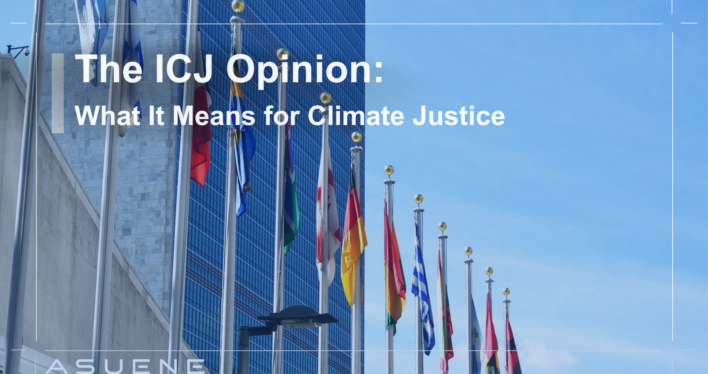- Article Summary
-
Introduction: A Historic Moment for International Climate Law
In a landmark moment for international environmental law, the International Court of Justice (ICJ) has issued an advisory opinion on the obligations of states with respect to climate change. Requested by the United Nations General Assembly (UNGA) and spearheaded by the Pacific island nation of Vanuatu, the opinion is the first time the world’s highest court has weighed in on climate justice. This non-binding but highly authoritative opinion is expected to shape global norms and increase legal and moral accountability for climate action.
As the world faces escalating climate impacts, from sea level rise to deadly heatwaves, questions about who is responsible, what obligations governments hold, and how justice can be pursued have come into sharper focus. The ICJ’s opinion offers clarity on these matters through the lens of international law, especially human rights and environmental treaties. This blog explores the significance of the ICJ’s opinion, its implications for vulnerable communities and future generations, and how it may reshape global climate litigation.

The ICJ and Climate Change: What Is the Advisory Opinion?
The International Court of Justice, headquartered in The Hague, is the principal judicial organ of the United Nations. Unlike contentious cases, an advisory opinion does not resolve a legal dispute between parties but rather interprets legal questions referred by UN bodies. In this case, the UNGA asked the ICJ to clarify the obligations of states under international law to address climate change and the legal consequences of failing to meet those obligations.
The ICJ considered several sources of international law:
- The United Nations Framework Convention on Climate Change (UNFCCC)
- The Paris Agreement
- The UN Charter
- Human rights instruments such as the International Covenant on Civil and Political Rights (ICCPR)
- Customary international law principles, including the “no harm” rule
A central conclusion of the opinion is that states have a duty to prevent significant environmental harm beyond their borders and to protect the rights of current and future generations. Importantly, the Court emphasized that these obligations are not discretionary; they derive from established legal principles.
Table: International Legal Instruments Cited by the ICJ
| Instrument | Key Principle Relevant to Climate | Legal Force |
|---|---|---|
| UNFCCC | Common but Differentiated Responsibilities | Binding treaty |
| Paris Agreement | Mitigation & Adaptation Goals | Binding treaty (with voluntary NDCs) |
| ICCPR | Right to life, health, housing | Binding treaty |
| Customary Law | Prevention of Transboundary Harm | Non-treaty, but legally binding norms |
A Win for Climate Justice: Impacts on Small States and Vulnerable Communities
For vulnerable communities, particularly small island developing states (SIDS), the ICJ opinion represents a significant step toward climate justice. Nations like Vanuatu, Tuvalu, and the Marshall Islands face existential threats from rising sea levels and increasingly severe storms. These nations have historically contributed the least to global emissions yet bear the greatest climate burdens.
The opinion supports the argument that wealthier states, with greater historical emissions and more capacity, must take the lead in climate mitigation and support. The principle of common but differentiated responsibilities is strengthened by this legal interpretation, aligning with calls from the Global South for greater equity in climate action.
The ICJ also affirms the rights of youth, indigenous peoples, and marginalized communities, who are disproportionately affected by climate change. By framing climate harms as violations of fundamental human rights, the opinion gives these groups a stronger legal foundation to demand action and redress.

Ripple Effects: How the ICJ Opinion May Shape Future Climate Litigation
While advisory opinions are not enforceable, they carry considerable moral and legal weight. National courts around the world may cite the ICJ’s reasoning when ruling on climate-related cases, especially those involving state responsibility, corporate accountability, or intergenerational equity.
Climate litigation is on the rise globally. High-profile cases such as Neubauer v. Germany, Juliana v. United States, and Milieudefensie v. Shell are using human rights frameworks to demand stronger climate action. The ICJ’s opinion will likely bolster such cases by confirming that failure to act on climate can constitute a breach of international law.
Legal scholars suggest that the opinion may also influence how courts interpret “duty of care,” “right to life,” and “right to a healthy environment,” potentially expanding the scope of climate accountability. Governments may find it increasingly difficult to defend inaction as courts adopt more robust interpretations of legal duty.
Conclusion: From Legal Clarity to Real-World Climate Action
The ICJ’s climate change advisory opinion is a watershed moment in the pursuit of climate justice. By clearly articulating the legal obligations of states and affirming the rights of vulnerable populations, the opinion provides a strong foundation for advocacy, policy, and litigation.
However, legal clarity must be matched by real-world implementation. Civil society, national governments, international organizations, and the private sector all have roles to play in translating this legal momentum into concrete emissions reductions, climate finance, and adaptation efforts.
The journey toward climate justice is far from over. The ICJ has given it a powerful boost. In the words of Vanuatu’s UN representative: “This is not the end. It is the beginning of a new era of accountability.”
Why Work with ASUENE Inc.?
Asuene is a key player in carbon accounting, offering a comprehensive platform that measures, reduces, and reports emissions. Asuene serves over 10,000 clients worldwide, providing an all-in-one solution that integrates GHG accounting, ESG supply chain management, a Carbon Credit exchange platform, and third-party verification.
ASUENE supports companies in achieving net-zero goals through advanced technology, consulting services, and an extensive network.


